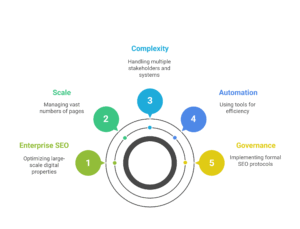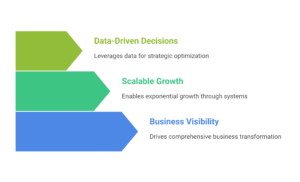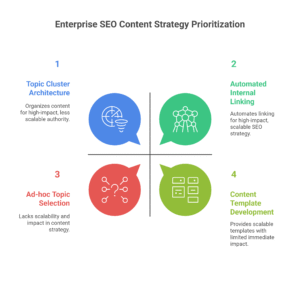Managing SEO for websites with thousands of pages requires a fundamentally different approach than traditional SEO. Enterprise SEO combines advanced technical optimization, scalable content strategies, and cross-department collaboration to drive meaningful business growth.
This comprehensive guide provides actionable strategies, proven frameworks, and real-world case studies to help you master enterprise SEO in 2025. Whether you’re scaling an existing program or building from scratch, these insights will transform your approach to large-scale optimization.
What Is Enterprise SEO?
Enterprise SEO is the practice of optimizing websites with 10,000+ pages, complex technical architectures, or multiple domains. Unlike traditional SEO focused on individual pages, enterprise SEO requires systematic approaches that scale across massive digital properties.
Key differences include:

- Scale: Managing hundreds of thousands or millions of pages simultaneously
- Complexity: Multiple stakeholders, departments, and integrated technical systems
- Automation: Heavy dependence on tools and automated processes for efficiency
- Governance: Formal protocols and approval processes for SEO implementation
- Integration: Seamless coordination with existing business and technical infrastructure
When Do You Need Enterprise SEO?
Consider enterprise SEO when your organization faces:
- Websites exceeding 10,000 pages or managing multiple domains
- Complex technical setups including CDNs, multiple CMSs, or microservices
- Cross-functional teams working on different website sections
- International operations requiring multilingual optimization
- Extensive product catalogs or database-generated content
- Corporate environments with multiple decision-makers and approval layers
The transition point typically occurs when manual page-by-page optimization becomes impossible to maintain effectively.
Unique Challenges for Large Websites
Enterprise websites encounter specific obstacles that smaller sites never face:
Technical Complexity: Large sites often integrate multiple content management systems, content delivery networks, and third-party services. Simple modifications can cascade into functionality issues across thousands of pages.
Crawl Budget Limitations: Search engines allocate finite crawl resources to each domain. With millions of pages competing for attention, ensuring search bots discover and index priority content becomes critical.
Content Duplication Issues: Large sites frequently generate duplicate content through category filters, product variations, and similar page templates.
Cross-Team Coordination: Success requires alignment between development, product management, content creation, and marketing teams with different priorities and timelines.
Why Enterprise SEO Matters in 2025

Impact on Business-Wide Visibility
Enterprise SEO extends far beyond search rankings to drive comprehensive business transformation. Organizations with mature enterprise SEO programs typically achieve:
- 40-70% increases in qualified organic traffic within 12-18 months
- Enhanced brand authority and market positioning
- Improved user experience resulting in higher conversion rates
- Decreased reliance on paid advertising channels
- Stronger competitive differentiation in digital markets
When executed properly, enterprise SEO creates sustainable competitive advantages that competitors find difficult to replicate quickly.
Opportunities for Scalable Growth
The fundamental advantage of enterprise SEO lies in its scalability potential. Properly designed systems and processes enable exponential growth where:
- Single technical improvements can enhance thousands of pages simultaneously
- Content frameworks generate traffic across multiple product categories
- Automated optimization systems continuously improve performance
- Cross-channel synergies amplify results across all marketing efforts
This scalability distinguishes enterprise SEO from traditional approaches focused on individual page optimization.
Data-Driven Decision-Making at Scale
Enterprise websites generate vast amounts of performance data. Leading organizations leverage this information to:
- Identify content gaps across thousands of keyword opportunities
- Predict technical issues before they impact search performance
- Automate content optimization based on user behavior patterns
- Make strategic decisions supported by comprehensive analytics
- Allocate resources to highest-impact optimization opportunities
Core Pillars of a Successful Enterprise SEO Strategy
1. Strategic Keyword Management at Scale
Enterprise keyword management requires systematic approaches that map search intent to business objectives and site architecture.
Keyword Clustering Strategy: Group related keywords into thematic clusters that align with your site structure. This approach ensures comprehensive topic coverage while preventing keyword cannibalization across similar pages.
Business Intent Mapping: Connect keyword research directly to business goals. High-commercial-intent keywords should align with product and service pages, while informational queries support content marketing objectives.
Competitive Gap Analysis: Use enterprise SEO tools to identify keyword opportunities where competitors rank but your site does not, enabling strategic content planning and quick win identification.
2. Scalable Content Creation and Optimization
Content production at enterprise scale requires systematic approaches rather than individual content creation.
Template-Based Optimization: Develop SEO-optimized templates for different content types that automatically implement best practices while maintaining brand consistency and quality standards.
Dynamic Content Generation: Leverage existing databases to create unique, valuable content for product pages, location-specific pages, or service variations without manual creation.
Content Governance Framework: Establish clear guidelines, approval workflows, and quality control processes that maintain standards while enabling efficient scaling.
3. Robust Technical SEO Infrastructure
Technical SEO at enterprise level requires architectural thinking and systematic approaches to handle complexity and scale.
Automated Monitoring Systems: Implement real-time monitoring that alerts teams to technical issues including broken links, server errors, and performance degradation before they impact search rankings.
Scalable Site Architecture: Design URL structures, navigation systems, and content hierarchies that accommodate business growth without creating SEO complications.
Performance Optimization: Deploy technical solutions that maintain fast loading speeds and excellent user experience across all page types and traffic volumes.
4. Automation and AI in SEO Workflows
Manual SEO processes cannot scale to enterprise requirements. Successful programs rely heavily on automation:
- Automated technical auditing and issue identification
- AI-powered content optimization and recommendation systems
- Dynamic internal linking based on content relevance algorithms
- Automated meta tag generation for database-driven pages
- Performance monitoring and anomaly detection systems
5. SEO Governance and Team Collaboration
Enterprise SEO success depends on organizational alignment and formal governance structures.
SEO Champions Network: Train representatives from different departments to advocate for SEO best practices within their teams and serve as liaisons for cross-functional projects.
Change Management Protocols: Establish formal processes ensuring SEO impact assessment for all website modifications, preventing accidental performance degradation.
Regular Cross-Team Communication: Schedule consistent meetings between SEO, development, content, and product teams to maintain alignment and address challenges proactively.
6. Omnichannel Integration (SEO + Paid + Social)
Enterprise SEO operates most effectively when integrated with other marketing channels:
- Share keyword research and performance data across paid and organic campaigns
- Leverage SEO content to support social media and email marketing strategies
- Coordinate messaging and positioning across all digital touchpoints
- Use cross-channel attribution data for better resource allocation decisions
Technical SEO for Enterprise Sites
Site Architecture and URL Structures
Enterprise site architecture forms the foundation for all SEO success. Poor architectural decisions create problems that become exponentially difficult to fix at scale.
Logical Hierarchy Design: Structure your site to reflect user intent and business priorities. Categories should be intuitive, and important pages should be accessible within three clicks from the homepage.
URL Best Practices: Maintain clean, descriptive, and consistent URL patterns. Avoid unnecessary parameters and ensure your URL structure can accommodate new content without creating conflicts.
Faceted Navigation Optimization: If using filters and facets for product or content browsing, implement them carefully to prevent duplicate content issues and crawl budget waste through proper canonical tags and parameter handling.
Technical Maintenance for Large-Scale Websites
Technical maintenance at enterprise scale requires proactive monitoring and systematic approaches rather than reactive problem-solving.
Comprehensive Technical Audits: Conduct quarterly comprehensive technical audits using enterprise-grade tools, with automated daily monitoring filling gaps between detailed assessments.
Error Monitoring and Alerting: Set up automated alerts for 404 errors, server errors, and other technical issues that could impact user experience or search performance.
Performance Monitoring: Monitor Core Web Vitals and other performance metrics across different page types, devices, and geographic locations to ensure consistent user experience.
Managing Crawl Budget and Indexation
With millions of pages competing for search engine attention, crawl budget optimization becomes critical for enterprise sites.
Crawl Budget Optimization: Use robots.txt, noindex directives, and canonical tags strategically to guide search engine crawlers toward your most valuable and frequently updated content.
XML Sitemap Strategy: Create comprehensive, well-organized XML sitemaps that help search engines understand your site structure and discover new content efficiently.
Strategic Internal Linking: Implement internal linking strategies that signal page importance and help distribute crawl budget to priority pages throughout your site architecture.
Core Web Vitals and UX Optimization
Google’s Core Web Vitals carry special importance for enterprise sites where technical complexity can easily impact user experience.
Largest Contentful Paint (LCP) Optimization: Optimize images, implement efficient lazy loading, and use content delivery networks to improve loading speeds across all page types and traffic volumes.
First Input Delay (FID) Improvement: Minimize JavaScript execution time and optimize third-party scripts that might delay user interaction capability.
Cumulative Layout Shift (CLS) Prevention: Ensure stable page layouts by properly sizing images and preventing content shifts during page loading processes.
Using Schema and Structured Data for Rich Results
Structured data implementation at enterprise scale can significantly improve search visibility when deployed systematically:
- Product Schema: Implement comprehensive product markup including prices, availability, and reviews for e-commerce pages
- Organization Schema: Mark up company information consistently across all relevant pages and locations
- FAQ Schema: Add FAQ structured data to appropriate content pages to capture additional search result space
- Review Schema: Implement review markup to display star ratings in search results where applicable
Content Strategy for Enterprise SEO

Building Out Content at Scale
Content creation at enterprise level requires systematic thinking and scalable processes rather than individual content piece development.
Content Template Development: Create SEO-optimized templates for different content types that ensure optimization while maintaining brand consistency and editorial quality.
Database-Driven Content Creation: Use existing business data to automatically generate unique, valuable content for product listings, location pages, or service variations.
Editorial Calendar Planning: Plan content creation around business objectives, seasonal trends, and strategic keyword opportunities rather than ad-hoc topic selection.
Topical Authority and Internal Linking at Scale
Building topical authority across large sites requires strategic content organization and systematic internal linking approaches.
Topic Cluster Architecture: Organize content into comprehensive topic clusters with pillar pages and supporting content that thoroughly covers each subject area relevant to your business.
Automated Internal Linking: Implement tools or custom solutions that automatically suggest relevant internal links based on content similarity and keyword relevance patterns.
Link Equity Distribution: Ensure important pages receive adequate internal link authority through strategic navigation design and content cross-linking.
Leveraging AI for Content Clustering & Optimization
AI tools have become essential for managing content strategy at enterprise scale:
- Content gap analysis across thousands of keyword opportunities
- Automated content optimization recommendations based on top-performing pages
- Dynamic content personalization based on user intent and behavior patterns
- Predictive content performance modeling for resource allocation decisions
International & Multilingual SEO
When to Go Global with SEO
International SEO expansion adds significant complexity but can multiply results when executed properly. Consider international expansion when:
- You have demonstrated strong SEO performance in your domestic market
- Market research confirms demand for your products or services in target countries
- You have adequate resources to properly localize content and maintain international sites
- Your business model and operations can support international customer acquisition
Implementing hreflang the Right Way
Hreflang implementation at enterprise scale requires careful planning and systematic execution:
Site Structure Selection: Choose between subdomains, subdirectories, or separate domains based on business requirements, technical capabilities, and resource availability.
Hreflang Implementation Method: Use XML sitemaps for hreflang implementation on large sites as they provide more reliable management than HTML tags across thousands of pages.
Content Mapping Strategy: Ensure every localized page includes proper hreflang annotations pointing to all relevant language and regional variations.
Localization vs. Translation: What Works Best
For enterprise SEO success in international markets, comprehensive localization consistently outperforms simple translation:
Local Keyword Research: Conduct thorough keyword research in each target market rather than assuming direct translation accuracy. Search behavior varies significantly across cultures and languages.
Cultural Adaptation: Adapt content to local cultures beyond language translation, including imagery, examples, case studies, and even color schemes that resonate with local audiences.
Local Link Building: Develop relationships with local websites, publications, and influencers for market-specific backlink opportunities and brand awareness.
Enterprise-Level SEO Tools & Platforms
Top SEO Tools for Automation and Monitoring
Enterprise SEO requires enterprise-grade tools capable of handling scale, complexity, and automation requirements:
Technical SEO Platforms: Tools like Screaming Frog SEO Spider, DeepCrawl, or Botify for comprehensive technical auditing, monitoring, and issue identification across large sites.
Keyword Research and Tracking: Enterprise versions of Ahrefs, SEMrush, or BrightEdge that can handle extensive keyword sets and provide API access for custom integrations.
Content Optimization: Platforms like MarketMuse, Clearscope, or seoClarity that can analyze and optimize content at scale based on competitive analysis and user intent.
Real-Time SEO Monitoring Solutions
Enterprise sites require continuous monitoring to identify and resolve issues before they impact performance:
- Automated alerts for technical issues including 404 errors, server problems, and performance degradation
- Ranking monitoring across thousands of keywords with automated reporting
- Traffic anomaly detection to identify problems or opportunities quickly
- Competitor monitoring to identify threats and market opportunities
Integrating SEO with Product, Dev & BI Tools
The most successful enterprise SEO strategies integrate seamlessly with existing business systems and workflows:
API Integrations: Connect SEO tools with content management systems, analytics platforms, and business intelligence tools for comprehensive data sharing.
Custom Dashboard Development: Build executive dashboards that combine SEO performance data with business metrics for better strategic decision-making.
Automated Workflow Creation: Develop workflows that automatically implement SEO best practices within content management and development processes.
Cross-Department Collaboration & Training
Building SEO Advocacy Across Departments
Enterprise SEO success requires buy-in and active participation from multiple departments throughout the organization.
Department-Specific Value Communication: Present SEO benefits in terms relevant to each department. Show developers how SEO improves site performance, demonstrate to content teams how optimization increases audience reach.
Quick Win Identification: Identify easily achievable improvements that demonstrate SEO value quickly and build momentum for larger initiatives and budget allocation.
Ongoing Education Programs: Provide regular SEO education to keep teams informed about best practices, algorithm updates, and new optimization opportunities.
Effective SEO Governance Frameworks
Large organizations require formal processes to ensure SEO considerations are included in all relevant business decisions:
SEO Review Processes: Establish mandatory checkpoints in development and content workflows where SEO impact is evaluated before implementation.
Change Management Protocols: Create procedures for evaluating and implementing website changes that might affect search performance or user experience.
Escalation Procedures: Define clear processes for resolving conflicts between SEO best practices and other business requirements or technical constraints.
Training Programs for Content, Dev, and Product Teams
Effective training programs should be role-specific and immediately actionable:
Developer Training Focus: Cover technical SEO fundamentals, site performance optimization, structured data implementation, and mobile-first indexing requirements.
Content Team Training Areas: Include keyword research methodologies, content optimization techniques, SEO writing best practices, and content performance measurement.
Product Team Education: Emphasize how SEO supports product discovery, user experience improvements, and business goal achievement.
Tracking & Measuring Enterprise SEO Performance
KPIs That Matter for Enterprise SEO
Enterprise SEO measurement extends beyond traditional metrics to focus on business impact and strategic value:
- Organic Revenue Attribution: Track revenue directly attributable to organic search traffic with proper attribution modeling
- Market Share of Voice: Measure your share of organic search visibility compared to competitors in your industry
- Customer Acquisition Cost: Compare the cost-effectiveness of acquiring customers through SEO versus other marketing channels
- Content Return on Investment: Measure the performance and business impact of different content types and topics
Dashboards and Reporting for Executive Stakeholders
Executive reporting should emphasize business impact rather than technical SEO metrics:
Business Impact Priority: Lead presentations with revenue, qualified leads, and business growth metrics rather than rankings or traffic volume alone.
Competitive Context: Show how your SEO performance compares to industry competitors and market benchmarks for strategic context.
Forward-Looking Analysis: Include predictive insights and strategic recommendations rather than focusing solely on historical performance data.
How to Tie SEO to Revenue and Business Goals
Making compelling business cases for SEO investment requires connecting organic search directly to revenue generation:
Advanced Attribution Modeling: Implement sophisticated attribution models that accurately represent SEO’s role throughout the customer journey and conversion process.
Customer Lifetime Value Analysis: Calculate the long-term value of customers acquired through organic search compared to other acquisition channels.
Brand Impact Measurement: Measure how improved search visibility affects brand awareness, recognition, and overall market position.
Staying Ahead: Google Updates and What to Watch
Helpful Content Update: What Enterprises Need to Know
Google’s Helpful Content Update carries significant implications for enterprise websites with large content volumes:
Quality Over Quantity Focus: The update prioritizes genuinely helpful content created for users rather than content produced primarily for search engine optimization.
User-First Content Strategy: Enterprise sites must audit existing content libraries to ensure all content serves real user needs and provides genuine value.
Author Expertise Demonstration: Clearly showcase author credentials and expertise, particularly for YMYL (Your Money or Your Life) content categories.
Core Updates and EEAT Signals
Experience, Expertise, Authoritativeness, and Trustworthiness (EEAT) factors are increasingly critical for enterprise site success:
- Experience: Demonstrate real experience with products, services, or topics through detailed case studies and examples
- Expertise: Highlight author credentials, qualifications, and subject matter expertise throughout content
- Authoritativeness: Build comprehensive topical authority through in-depth content coverage and industry recognition
- Trustworthiness: Maintain accuracy, provide clear editorial standards, and ensure transparent business practices
Conclusion
Enterprise SEO represents a long-term strategic investment rather than a quick tactical implementation. Focus on building sustainable systems that will drive consistent growth over years rather than months. Organizations that master enterprise SEO principles in 2025 create significant competitive advantages that competitors find difficult to replicate quickly.
Begin with solid fundamentals, think systematically about scalability, and maintain continuous optimization efforts. Your enterprise SEO transformation starts with the first strategic decision to prioritize systematic growth over tactical implementation.


